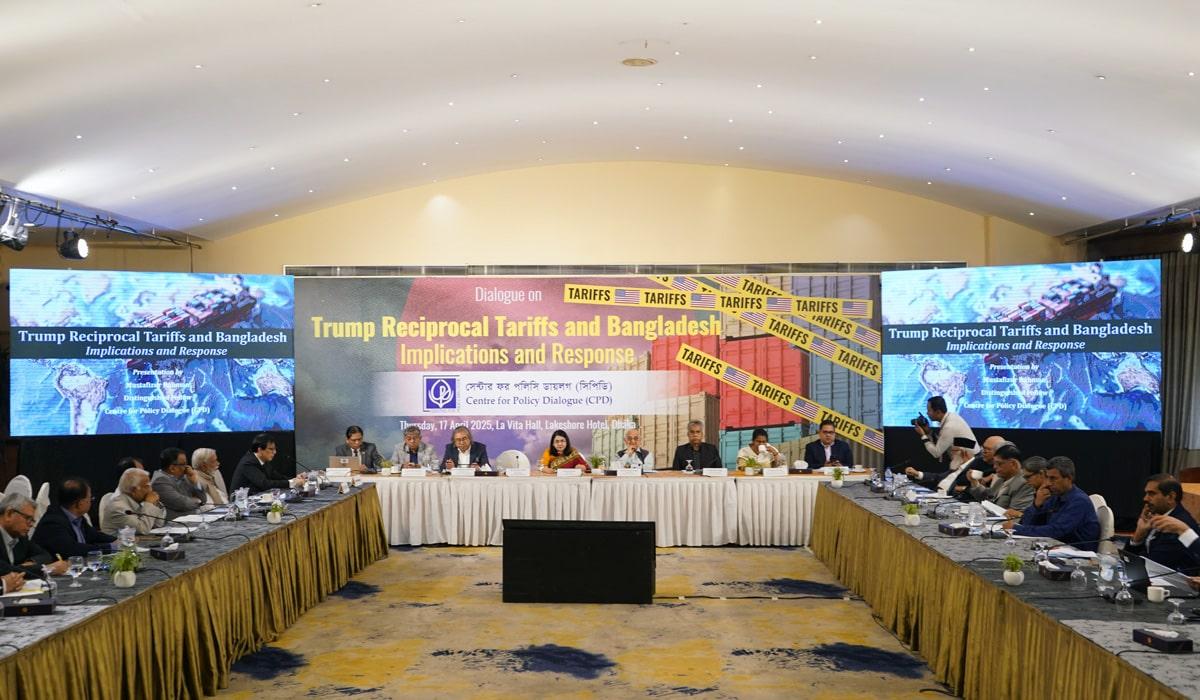
In response to Trump’s reciprocal tariffs, Bangladesh should actively pursue a Bilateral Free Trade Agreement (FTA) with the US. This would provide a framework for tariff reductions, address non-tariff barriers, and improve trade relations, particularly benefiting Bangladesh’s key garment sector. An FTA would help mitigate the impact of rising tariffs, creating more favourable export conditions.
This recommendation emerged from the dialogue titled ‘Trump Reciprocal Tariffs and Bangladesh: Implications and Response,’ organised by the Centre for Policy Dialogue (CPD) on 17 April 2025.
Dr Fahmida Khatun, Executive Director, CPD, chaired the session and remarked, ‘The Trump tariffs
have raised the trade-weighted average tariff of the USA from the previous 2.0 per cent to an estimated 24.0 per cent, a level not seen in over a century. Even in 1990, the US import-weighted tariff was 8.0 per cent. During the pause, the import-weighted US tariff is expected to be around 12.0 percent.’
Bangladesh should seek an FTA, but it is critical to avoid rushing into decisions given the uncertainty surrounding US tariff policies. Professor Rehman Sobhan, Founding Chairman of CPD, advised against premature actions, noting that with the unpredictable nature of Trump’s tariffs, a hasty response could be detrimental. Instead, Bangladesh should observe the outcomes of US negotiations with key players like Vietnam before taking further steps.
Professor Mustafizur Rahman, Distinguished Fellow, CPD, stressed the importance of the Trade and Investment Cooperation Forum Agreement (TICFA) between Bangladesh and the US. TICFA provides a platform for addressing critical tariff issues, ensuring stable trade conditions for sectors like textiles, despite broader global disruptions.
Professor Rahman also suggested that Bangladesh reduce customs duties on key US imports, such as medical equipment and semiconductors. This would strengthen trade ties and encourage reciprocal tariff reductions, rebalancing trade relations and fostering a more favourable environment for Bangladesh.
Further, enhancing Bangladesh’s investment climate is essential to attract Foreign Direct Investment (FDI), particularly from the US. Increased FDI would help reduce the trade deficit with the US and improve Bangladesh’s industrial resilience.
To mitigate the effects of tariff disruptions, Bangladesh should diversify its trade relationships beyond the US, expanding partnerships with the EU, China, and emerging markets. This strategy will reduce reliance on the US, opening new export opportunities and providing a cushion against disruptions.
Bangladesh must also strengthen its legal framework to comply with WTO regulations on trade transparency, customs valuation, and intellectual property protection. This will improve its credibility in global trade negotiations and ensure stable trade relations.
Amidst ongoing uncertainty, Mr Md Fazlul Hoque, Former President of BKMEA, recommended that Bangladesh avoid rushing trade decisions. With the unpredictability of US tariff policies, it is vital to support small and medium-sized factories and await clearer outcomes from global negotiations.
Dr Mostafa Abid Khan, former Member of Bangladesh’s Tariff and Trade Commission, highlighted the challenges in responding to the US tariff strategy, noting that any response from Bangladesh would yield limited benefits due to the infeasibility of importing USD 70 billion worth of goods to balance trade.
Mr Md Mahbub ur Rahman, CEO of HSBC Bangladesh, warned that the reciprocal tariffs could undermine Bangladesh’s competitive advantage, making it harder for its products to compete in global markets. A roadmap to enhance product competitiveness and identify target markets is essential.
The reciprocal tariffs have disrupted supply chains, with orders being held back and many brands requesting discounts, according to Mr Shams Mahmud, President of the Bangladesh Thai Chamber of Commerce and Industry. This has led to significant cash flow disruptions for businesses.
Ms Taslima Akter Lima, President of Bangladesh Garments Sramik Sanghati, emphasised the difficulties in setting fair wages for factory workers amidst inflation. The additional burden of reciprocal tariffs would further complicate efforts to raise wages for workers.
High-level policymakers, government officials, business leaders, trade specialists, and journalists attended the dialogue, contributing valuable insights.


